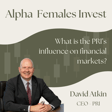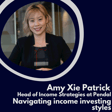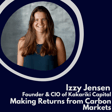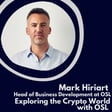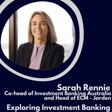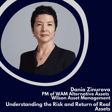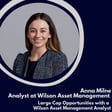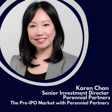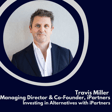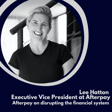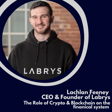Introduction and Disclaimer
00:00:00
Speaker
As usual, any information discussed in this podcast is not financial advice. All opinions reflect those of the individuals and this podcast is for educational purposes only. You should always read the PDS and talk to a financial advisor who can consider your personal circumstances before you invest.
00:00:17
Speaker
If you like listening to Alpha Females Invest, we would love your support on Instagram, at AlphaFemalesInvest, and you can also find us on LinkedIn. And if you do want to find out more information about us and our episodes, you can visit our website at alphafemalesinvest.com.au, and please note that episodes may be supported by guests from time to time.
Meet Laura Hillis: A Journey in Sustainable Investment
00:00:41
Speaker
back to the Alpha Females Invest podcast. Two females working in the finance industry searching for alpha. My name is Emily. And my name is Maddie. And together we bring diversified perspectives from the buy and sell side of the finance world. Today we're very excited to have Laura Hillis live from London to join us to discuss what is driving the engagement versus divestment debate in sustainable investing.
00:01:06
Speaker
Laura is the Director of Climate and Environment at the Church of England Pensions Board, a £3.2 billion pension fund which provides retirement housing and pensions set by the Church of England, aiming to be a leader in stewardship and responsible investment. Laura began her career working in insurance and banking at the Suncorp Group before joining Bank Australia, where she led the development of the bank's inaugural responsible banking and climate policy.
00:01:34
Speaker
Her most recent position as a director at the Investor Group on Climate Change involved leading a corporate engagement and stewardship program with over 100 institutional investors engaging on climate change with companies in the mining, industrials, and oil and gas sectors, and building the Climate Action 100 Plus engagement program in Australia. She's currently co-chair of the Institutional Investor Group on Climate Change corporate program and its lobbying and mining work streams.
00:02:04
Speaker
Laura is also studying a Master of Sustainability Leadership at the University of Cambridge, where her research is focused on mobilising greater capital from institutional investors into climate finance. So thanks for joining us on the show today, Laura. We're very much looking forward to this episode. Thank you so much for having me. Great. And to kick us off, we'd like to start with a question. We enjoy asking each one of our podcast guests
00:02:31
Speaker
Could you please share with us your most embarrassing career moment? No problem. So I've been thinking about this for a couple of days. And unfortunately, I had a lot of potential inspiration to draw on for this question because I feel like I'm constantly embarrassing myself. But one thing that I realized was a lot of my embarrassments tend to come from basically being like in an information deficit where you're in a situation where you have
00:03:00
Speaker
turned up and you don't understand what's being discussed or maybe you don't particularly know anything about this particular issue with maybe it's a climate change or a social issue or even it's an asset class that you have no familiarity with.
00:03:11
Speaker
And I feel like that's happened to me a lot in my career. But this particular example happened really recently actually, which makes it even more embarrassing. Shortly after I moved to the UK, I'd been invited to a very posh dinner that was put on by the UK government. And for some reason I ended up sitting at like table one, you know, in those conference facilities, there'll be like the tables that are right up front and they normally reserve them for quite important people, which I am not.
00:03:36
Speaker
And somehow I ended up at that very front table with a really good seat and ended up being seated next to this guy who I had this lovely conversation with. We were chatting away. He seemed really lovely. I asked him at one stage, what do you do for work? And he said, oh, you know, I kind of work in
00:03:52
Speaker
for the UK government. And I was like, OK, great. We talked about climate change. May have made some comments about UK government policy on climate change that I may or may not have regretted later when I found out who he was. And then we get to the keynote speech. And the guy next to me, who I've had this lovely chat with, we've been talking about his children and his town, gets up, does the keynote. And it turns out he is a very prominent UK politician who played an outsized role in the country's climate policy.
00:04:22
Speaker
And I really should have known that. So when he sat down, I felt quite embarrassed. That is a really great embarrassing moment. Oh my God. We've all had those things where we're chatting away, no idea who the person is, but your example is an amazing example of that. But I'm sure you impressed him with your knowledge.
00:04:38
Speaker
I hope so. But it's one of those things about moving to a new country. You don't realise how little you know about a country until you move to it and all of a sudden you're dealing with different words and different culture. And even though the UK and Australia are pretty similar, it's definitely been an eye-opening experience for me moving here and having to get my head around everything. Yeah, I can definitely relate to that being also based in London at the moment.
From Engagement to Divestment: Strategies in Responsible Investment
00:05:03
Speaker
So obviously we gave a little bit of a background of your role and your history in your career, but it would be great if you could just give, in your words, a bit of an overview about your previous and current role and how it got you to where you are today.
00:05:18
Speaker
Yeah, no problem. So I have a really unusual background for getting into the investment industry. I actually started my career, I was planning to become a high school teacher, because coming out of my high school, that was a pretty that was considered to be a pretty illustrious career, really in the town that I came from, and I had high marks. And that was kind of what you did. So it was kind of either become a nurse or a teacher or a
00:05:42
Speaker
or a tradesperson felt like the career options in front of me. In hindsight, I would have done completely different things, but I didn't know that at the time. But thankfully, during studying that, I stumbled upon doing a couple of subjects in economics, and I dropped teaching
00:05:57
Speaker
I did some other subjects in business and communications and I ended up going into working in the communications industry for a little while and then worked in insurance in the kind of original kind of corporate social responsibility teams, which I think were kind of the precursor to sustainability. And then since then, I've really worked my way around the finance industry working in various kinds of sustainability roles.
00:06:19
Speaker
About six years ago, I ended up working for the investor group on climate change, which is a really important industry association in Australia for investors who are interested in managing climate related risks and opportunities. And so many of your listeners, I imagine, would probably find that their institutions would be members of IGCC.
00:06:37
Speaker
And so I was working there to try and really build out the IGCC's corporate engagement program, which was really around how do investors in Australia want to engage with high-emitting companies that really face a lot of climate risks and opportunities. And so I was there for about four years and then just in the last 12 months have moved to the UK and I'm working for
00:06:59
Speaker
as mentioned, the Church of England's pension fund. So my focus in this role is on a combination of looking at stewardship, so engaging again with companies, particularly on the climate and environmental related topics. But I also do some work on investment strategy as well. So looking at how we can increase our allocation to climate solutions, how we can change our portfolio mix to better integrate climate risks and opportunities.
00:07:23
Speaker
Awesome. Thanks so much, Laura. That's really helpful background and such an amazing career journey. And it's great to see the different pathways that we can all take to find what we're passionate about. So maybe to set the scene on this podcast relating to engagement versus divestment in the investment process. And I think this will be particularly helpful for listeners who may not have an ESG and sustainable investment background.
00:07:53
Speaker
you be able to please explain, Laura? Firstly, what is divestment in the investment process? And secondly, what does the process of engagement refer to? Yeah, no problem. So within responsible investment, really, what you're looking to do is incorporate your understanding of environmental, social or governance factors to really either realise returns or manage risk. And the way these two
00:08:19
Speaker
I guess you could say, play out, is you would use engagement with various different issuers that are represented in your portfolio, but often when we talk about engagement, we're talking about particularly public equity and also corporate bonds.
00:08:34
Speaker
When you would do that, you're often looking to either reduce the risk that that company or issuer might present in your portfolio, or you might be looking to create more opportunities and really to realize more values through that engagement. So it's about really kind of helping that company.
00:08:50
Speaker
to move forward in a positive way and to realise some of those opportunities. And sometimes what happens is you realise that either that company or that issuer isn't in a position that you're comfortable with long-term, maybe they're not able to change, maybe the industry that they're in fundamentally misaligns with where you want to see your assets invested. And it might be that
00:09:13
Speaker
long-term, you see that the particular company or sector just represents too large a risk for you to continue to have them in your portfolio. That's really where exclusion or investment would come in. And I guess the way that it's commonly used at the moment, particularly when it comes to climate change specifically, is what you see is that
00:09:33
Speaker
investors will often pick out a handful of companies or possibly a lot more than a handful of companies that are seen as being really high risk to them from a climate change perspective or really important in the climate transition. And they'll really only exclude, typically as a last resort, that sort of common practice in the industry,
00:09:51
Speaker
to say, okay, we'll try and engage with these companies. And if we're not comfortable with where they're at, then exclusion or divestment would be a really last resort type of escalation tactic. And often investors will run through other escalation tactics to try and change the company's behavior before they take that decision.
00:10:08
Speaker
Great. Thanks, Laura. That's a really good background and I think sets the scene really well for the topic of conversation for this episode. I might just refer to the Church of England Pensions Board as the COE, if that's okay, just for simplicity.
Aligning Investment with Values: The Church of England's ESG Philosophy
00:10:23
Speaker
But can you please tell us what the COE investment philosophy is as it relates to ESG and investment, and who are the ultimate beneficiaries of the money that you're managing?
00:10:36
Speaker
Okay, so I might start with the first part of that, the second part of that question first. So our beneficiaries are 42,000 people who either have worked for, currently work for the Church of England. So that includes people who are in really religious roles. So that might be clergy. But it's also people who work within the kind of head office of the Church of England. So my pension, for example, is managed by us as well.
00:10:59
Speaker
So that's our beneficiary base. And so when we're thinking about our investment philosophy, we think about a couple of different things. The first one is we believe that our beneficiaries have given us really sufficient feedback that they would like at their pensions to be managed in a way that aligns with the overall sort of ethos and values of the Church of England. So that means that we incorporate really Christian teachings into how we think about our responsible investment policies.
00:11:25
Speaker
So that's part of how we do things. But the second thing that we think about, and this is less about our beneficiaries or our, sorry, this is less about, I guess, the Christian ethos. And this is more about our position as a pension fund and our legal obligations to pay pensions into the second half of the century. And certainly beyond that, most likely. But by the time, you know, you have people who are retiring in the 2070s, they're probably going to live beyond the end of the century.
00:11:54
Speaker
So when we're thinking about that, we apply an approach that is becoming more common in the pension industry, which is called systemic stewardship, which is really about thinking about not just the opportunities to drive value in the short term, which is kind of what investors tend to be known for in the industry, that we're very focused on getting as much value in the short term as possible.
00:12:14
Speaker
But it's really about thinking about the big, difficult, complicated systemic risks that will impact the entire global economy and how those might play out in portfolios across the next 10, 20, 30, 40 years and beyond. And as I said, we have a legal obligation to pay pensions well into the second half of the century. So this is quite relevant to our legal obligation to our beneficiaries. But we're also, like many pension funds, we consider ourselves to be a universal owner, which means that we're
00:12:43
Speaker
Really, we kind of own a little slice of everything. And so that means we're exposed to kind of the all of the different things that happen in the global economy. And there's not really an easy way of hedging against that. So we've adopted this approach of systemic stewardship in order to try and minimize those big, complicated, systemic risks that will be coming in our direction over the next many decades. And climate change is a great example of that.
00:13:08
Speaker
Great. Thanks, Laura. That's really interesting and helpful background and probably a good time to discuss the Church of England's decision last year in June to exclude all remaining oil and gas companies from its portfolio and
00:13:27
Speaker
also exclude, I believe, other companies primarily engaged in those oil and gas activities unless they were genuinely aligned with a 1.5 degree pathway by the end of calendar year 2023. Correct me if I'm wrong. I'm sure you're the expert on all the details, but I'd love to
00:13:50
Speaker
hear more about the process of making that decision and the timeline and yeah, all the things involved. Yeah, no problems. One of the things that's always funny about this conversation is people always think that we kind of woke up one day and decided to divest the oil and gas sector, which is absolutely not the case. So we started engaging with the oil and gas sector more than 10 years ago, which is a lot longer than I have been working for the Church of England. However,
00:14:18
Speaker
Over the last five years in particular, since 2019, we set out a really dedicated engagement program that had very clear goals, very clear hurdles, and had a clear list of focus companies. And this meant that actually what happened in practice was over the five years, we actually did exclude a number of companies during the process.
00:14:38
Speaker
So for example, about midway through companies that did not have a scope three target for 2050 were excluded. So that happened kind of halfway through the process. And it was only in 2023 where we were looking for, it was basically our final hurdle. We wanted companies by that point after five years of engagement and very clear
00:14:56
Speaker
expectations that we'd set with companies to be aligned, to have their emissions reduction targets aligned across scope one, two and three in the short term, medium term and long term. That was the hurdle we set. I'm just going to say I recognise that that is an incredibly high hurdle for an oil and gas company, which is part of the reason why we put five years in. We used collaborative engagement. We did a whole range of different tactics.
00:15:21
Speaker
to try and make that happen. And truly, a lot of people have sort of expressed skepticism when I explained kind of how high that bar that we set was. But truly, there was a huge amount of disappointment in our team.
00:15:37
Speaker
when we realised that none of the companies would actually pass that. The other thing I should say is there were a couple of companies in particular where we did the final assessments and we were able, one of the great things was we used Transition Pathway Initiative or TPI
00:15:51
Speaker
assessments to do this. And they had started at about 2018-2019. So we're actually able to track the progress over the five years. And certainly not taking our tiny pension fund is not the driving factor in seeing this happen. There were lots of investors engaging with these companies over that period and doing really great work. Plus, you know, government policy changes, there's lots of things that go into this.
00:16:12
Speaker
But over that five-year period, we saw a huge improvement in those companies' emissions reduction pathways and their alignment with 1.5. So it wasn't like nothing changed. It was just that it didn't meet that hurdle that we had set. So it was five years, very intensive engagement, including playing lead investor roles within the CA100+. And when we realized the companies wouldn't meet that hurdle, we made the difficult decision to divest.
00:16:37
Speaker
And Laura, I think we can dive into some of the feedback that was provided publicly on that decision. But at the end of the day, when you set engagement outcomes, there should be consequences when those outcomes don't get met because you've set them for a reason, either to reduce the risk of your portfolio or to align your portfolio with a certain sustainable investment criteria. So at the end of the day, you kind of, I guess,
00:17:05
Speaker
talked the walk on the whole engagement process. So I think it makes a lot of sense. But I think just it would be interesting to understand how much of the portfolio was made of oil and gas names prior to the divestment.
00:17:20
Speaker
Yeah, so it was around 3 million pounds. So it was very, very small in terms of our overall portfolio. So our portfolio is 3.2 billion pounds. I don't know off the top of my head what that is in percentage terms, but it would be absolutely tiny, right? I don't know what it was in 2019, but I know it was a lot higher.
00:17:43
Speaker
at that point. So over time, because of in part because of the hurdles that I'd set out before, we were reducing our exposure, but also we do use
00:17:53
Speaker
an index that we apply to our public equity portfolio that automatically for us overweight. So it's a passive index, but it overweights companies that have stronger alignment with climate pathways, stronger governance on climate change, and it underweights companies that don't. And we had put that in place in about 2021. So this means that we had basically over time started to reduce our exposure to companies that have poorer sort of climate transition plans anyway.
00:18:20
Speaker
Great, thanks Laura. That's really interesting to see how it changes over time and the importance of that five-year engagement plan as well and giving companies opportunities to engage and collaborate with you. Did the Church of England accept
00:18:38
Speaker
completely out of their oil and gas positions before publicly announcing the decision? Or was it more after sharing that with the community?
Divestment Decisions and Market Reactions
00:18:49
Speaker
Some of it would have been before and some of it would have been after, just in terms of the way our asset managers would have executed the decision process. So one thing that's probably useful to hear is partly because we're so small, we don't do any of our own direct investment. We outsource, I think we have about
00:19:06
Speaker
30 odd asset managers at the moment who manage different asset classes for us. So because of that, the actual investments were made at different times, but it was all around the middle of last year. That makes sense. Thanks, Laura. And I think it would be interesting to also hear about how the investment team and the responsible investment team
00:19:30
Speaker
thought about share price returns and performance in the process of divestment and who might have been taking part in those conversations.
00:19:39
Speaker
Yeah, look, it was a it was a difficult decision on multiple fronts. And so when we made the decision, we had to weigh up obviously, both the responsible investment and ethical approach and also exactly what you said, Emily, that, you know, we'd set out this clear plan. If you are going to do that, you kind of need there needs to be a bit of follow through if you're going to be doing good.
00:20:00
Speaker
stewardship. So there was kind of that part of the equation and then the other part was obviously we were sitting in a year that New Orleans Gas Sector had had one of the best financial performance years on record, I think. So it was a really
00:20:16
Speaker
Interesting time to making the decision, but fundamentally, as I said previously, when you look at these, there's a few pieces of analysis we took into account around looking at things like CapEx and where the companies were sitting in terms of CapEx and what you would expect if they were genuinely committed to the transition.
00:20:35
Speaker
we looked at the risk of stranded assets and we looked at this across multiple timescales. And so when you do that, you quickly get a lot of comfort that if you are moving away from this sector, that yeah, there's a lot of risk in terms of holding onto that to companies in that sector as well. So I think that definitely played part of it, part into the decision making process as well.
00:21:01
Speaker
Yeah, that makes a lot of sense and it probably worked out to be a good time to exit the names anyway. But I'm interested in, I guess, because it is a relatively controversial decision that did attract a lot of media attention.
00:21:18
Speaker
I'm just interested if you could talk us through some of the positive and negative feedback related to the decision from the media, but also potentially members of your investment community, so your beneficiaries, and even more broadly from other investment communities. I know that I saw you present on a panel at a sustainable investing conference
00:21:41
Speaker
And it generated a lot of discussion even within the room, so other asset managers and other owners. So interested if you could sum up the key feedback points.
00:21:50
Speaker
Yeah, thanks, Emily. I remember that that was the Oxford Sustainable Finance last in summer last year, which was a really great event, I thought. But it was interesting to me just how much of that it was a panel discussion, there were four other really great speakers. But so much of that conversation kept coming back to this one decision that we had made, which I found really interesting. But I guess it's emblematic of some of the
00:22:11
Speaker
the debates that are happening within the sector. And I guess so I'd probably say two things about this. One is that I think the debate in the public square is unfortunately, it's very different to the debate that's happening within the industry. And I think the debate that's happening within the industry is richer, it's more nuanced, it's based on a clearer headed view of what's needed and what's actually going to be effective. And I think the debate in the public square can get a bit
00:22:37
Speaker
emotional but also I think divestment arguments as an impact strategy that that is going to negatively affect the financial performance of the company. I think it feels instinctively true and so people get very carried away by that idea because it feels right. I remember sort of 10 years ago I assumed that that was right because the argument made sense right if you get investors to divest from companies that will impact the company but unfortunately the academic research doesn't support that.
00:23:06
Speaker
And it's possibly because it hasn't happened at the kind of scale you would need for it to make a difference. But also the other argument is that basically when you sell your shares in a particular company, that the person who buys them, the institution that buys them may not have the same climate interests that the previous buyer may have. So it actually might end up leading to a worse outcome. So that's kind of the
00:23:30
Speaker
the downside of investment argument. The other downside argument I guess is that fundamentally what happens on the secondary market or when you're trading public equities maybe doesn't have a big impact on the cost of capital or liquidity anyway because these sorts of companies have really strong balance sheets. They probably don't, they're probably not as reliant on equity
00:23:52
Speaker
as other institutions that are smaller might be, but also they're not as reliant on that as they might be sort of bank financing or other sources of capital. So that's kind of, I think, where the debate's sitting at the moment. On the other side of the coin, there is a question about whether institutions, particularly institutions with big names or sort of a fairly well-known, whether they can make a big,
00:24:16
Speaker
whether they're making a statement like this sends an important public signal that influences public sentiment, that influences policy. And so there's an academic at Cambridge who said something to me recently, which is broadly that she's come to the conclusion that if you have more money than fame, you should stay in the company and you should keep engaging because your money can be really effective in helping
00:24:39
Speaker
push that company in a particular direction. And if you have more fame than money, it probably makes sense to divest and make that statement publicly and send that public signal. And it's interesting to me because we have seen a few more of these since we did it. And I'm not saying that we had anything to do with that. Of course, we didn't. But it's interesting seeing other
00:24:57
Speaker
investors run through similar processes and come to a similar conclusion. We've seen one of the big Dutch pension funds and also a New York pension fund come to a very similar conclusion, following a lot of deep engagement with the oil and gas sector as well. So I think that's probably a decent summary of the upsides and downsides, hopefully. Great. Thanks so much, Laura.
00:25:22
Speaker
Um, you mentioned earlier, just the structure of the, of your organization and I'd be really interested in understanding how, you know, being a religious organization, how that influenced the
00:25:40
Speaker
the exclusions process and what stakeholders might have been involved more unique to your company. So I think in practical terms, the fact that the organisation is linked to the church and has
00:25:56
Speaker
Church of England employees as beneficiaries probably doesn't make a huge difference in terms of our engagement process per se. It's probably more around the inputs into that. So as I mentioned earlier, we have an ethical advisory committee that is comprised of theologians, ethicists, people who have a really solid understanding of how to interpret sort of Christian texts
00:26:21
Speaker
and turn that really into guidance for our responsible investment approach. And so we absolutely use that. It doesn't determine our investment decisions, but it does provide guidance for us and other church investors, I should say. It's not just the pensions board that use that advice. So that's definitely part of it. But we also do just, you know, very similar to other pension funds, we do as much stakeholder engagement as we can to really understand
00:26:51
Speaker
you know, what the views of our beneficiaries are and to really try and incorporate that into how we think about how they want their pensions to be invested as well. So I think the the Ethical Advisory Committee is probably an unusual part of how we do things, but the general wanting to know what our beneficiaries want and think, I think that's probably a pretty standard part of the process.
00:27:12
Speaker
Thanks Laura, that makes sense. So moving on back into the focus of your engagement with the oil and gas name. So you mentioned earlier that you had a five year engagement plan and you're only divested following lack of action on your hurdles.
The Art of Engagement: Influencing Corporate Change
00:27:29
Speaker
there an opportunity cost of engagement given how much resource intensive that is actually required for meaningful engagement? And I guess if you could share any advice on how we can prioritize our engagement efforts with corporates.
00:27:45
Speaker
Yeah, it's a really tough question as anyone in stewardship knows. How do you prioritize when you own thousands of companies typically, and you need to prioritize them and also think about the most important themes to be talking to particular companies with as well.
00:28:05
Speaker
a couple of things. So when we were dealing with the oil and gas companies in particular, because we were trying to do a really comprehensive job, we were trying to use the best evidence we could, it was very resource intensive. And I mean, you would know personally and when you're reading company reports and you're going along to calls, like all of this stuff takes time, sometimes as well. And this is a fun thing about being a stewardship professional, but it also links back to what I said at the beginning about, you know, being embarrassed in your career, there's constant
00:28:33
Speaker
points where you don't feel like you are an expert on a particular topic. So, you know, recently for other engagements, I've weirdly become a bit of an expert on coal mine methane, which I don't think that is something I ever would have learned about. But it's just because you really need to understand a company well to be able to engage with them really effectively. You need to understand the sector well, you need to understand what their peers are doing.
00:28:55
Speaker
So that took up an enormous amount of time. And one of the good things for us, having made the decision to divest the companies, we didn't really think about this at the time, but in hindsight, it's freed up a lot of capacity for us to focus differently. And so what we're looking at now, and again, this links back to what I said earlier about our systemic approach, is we started looking at which of the systemic kind of levers that we have remaining as an investor when we're no longer kind of invested in the supply side of fossil fuels. And we started thinking about
00:29:25
Speaker
the demand side picture and so now we have done a lot of analysis and we've identified a handful of companies that we think are really material in terms of their use of fossil fuels and they're kind of structurally important because if you think about say an auto's company an airline
00:29:43
Speaker
a steel company, utilities company. The way they structure their business is very much around their use of fossil fuel. So getting those companies, those sectors to transition will actually transition entire economies. So that's kind of how we thought about it. But in terms of advice to other investors, I would be, it's absolutely about what levers do you have? What are the tools that you have available to you as the type of investor that you are?
00:30:07
Speaker
what are the resources that you have available and then identifying those really key systemic issues. And I think it can be helpful doing both a top down and a bottom up sort of analysis where you look at what are our portfolio holdings and then looking top down at what the issue is and what the levers are that will actually drive change on that issue. Awesome. Thanks so much, Laura. That was really, really helpful advice for good engagement with good effective engagement with companies. Um,
00:30:37
Speaker
I'm curious, are there any other industries in which you've set engagement plans for or maybe rather than industries, any certain thematics or particular ESG focus areas? Yeah, so I specifically look after climate change, but we have two other responsible investment directors in the team. One looks after social and one looks after governance. So we have other themes through there, but I'll just talk about the climate change ones.
00:31:04
Speaker
So within climate change, our current focus sectors are autos, utilities, steel, banks and mining companies. Mining companies might sound like they make less sense in light of what I just said about demand side, because they do demand, I guess, some, a lot of energy in a lot of cases, a lot of electricity, but they probably don't fit quite into the picture I just described, but we really see them as really important companies.
00:31:29
Speaker
Systemically, because they supply a lot of the materials that we needed for the transition, including some of the materials that need to decarbonize, like say the steel. So that's why we still have mining companies. And then the key themes we're really focused on are three things. And this is because we think these three themes are the most material in terms of understanding a company's climate transition pathway. And that is emissions reduction targets, which I just talked about how we kind of used those with the oil and gas companies.
00:31:57
Speaker
And we try and do pathway assessments that we can understand how well they align to sort of 1.5 or two degree scenarios. Number two is capex, how much they're actually spending on the green transition. In the case of say an autos company that might be EV production targets would fit into that.
00:32:13
Speaker
In case of a mining company, we're looking for things like transition materials. And then the third one is actually corporate climate lobbying. So what are companies doing in terms of their public policy and lobbying approach, including their industry associations. And we're interested in this because it seems like a real risk to delaying the transition to net zero that a lot of companies are still lobbying.
00:32:33
Speaker
against good climate policy. So that's a concern for us as an investor in the economy. But more broadly, I think it actually tells you something about the company's transition plan, because if a company is really committed to a rapid, ambitious, net zero transition, why would they be arguing against policy that would help get them there? It doesn't quite add up. So it does actually tell you a lot about where the company really is, where their risks are, if you can really understand what their current policy positions are and what they're asking for from governments.
00:33:02
Speaker
That's a really good summary. I think that is a very valid point. So we spoke earlier in the conversation about, you know, there's not academic research that supports the divestment approach, but you mentioned that maybe that's because there's an inherent buyer on the other side. So when you, you know, in public equities, particularly, you know, you, you sell a stock, someone else is a buyer on the other, other side. So there's still always ownership of that business.
00:33:28
Speaker
But do you think if enough of the investment community excluded or divested from environmentally negative names that could actually move the needle and there's enough capital incentive to motivate behavior, particularly on the debt side, if they can't get equity and they can't raise equity because no one's buying the stock because
Impact of Divestment on Companies: A Costly Move?
00:33:49
Speaker
It's been divested and the banks may also see it as a high risk and stop lending or push up the cost of capital and raise their capital prices because of that extra risk. Could that actually incentivise behaviour? Could there be a movement where the investment community can make meaningful change just based on the threat of divestment?
00:34:14
Speaker
I think, as I said earlier, I think that the threat of public divestment from sort of well-known players is effective. I do think it concerns companies. They don't want to be in the position that the companies were in last year and have been several times since, as I said, where kind of well-known investors are saying, hey, we're pulling out, we're pulling out, we're not comfortable with this company's plan. I think that is
00:34:39
Speaker
I think it has an impact and I think the companies don't want that to happen. But I think your question kind of links more back to kind of where can you have that cost of capital or liquidity change that then changes the company's behavior just by virtue of the fact you've excluded the company.
00:34:55
Speaker
And I think that's trickier, but what the evidence seems to suggest is that the larger the company is, the stronger its balance sheets. When we're talking about these really large companies, the impact is probably less, but it's probably more on small caps and medium-sized companies because they actually need that capital from equity investors.
00:35:16
Speaker
and that their balance sheets aren't as strong, right? And so there's that. And then the other thing I would say that's really important here is there is actually a lot more evidence for the role of fossil fuel exclusions from banks. So actually where you get a policy from a bank that says we're not going to lend to this business or we're going to phase it out by a particular point, or you have to have really robust transition plans in order to remain a customer, that seems to have a lot more evidence behind it because fundamentally a lot of
00:35:46
Speaker
Particularly when we're talking about fossil fuel expansion, we're talking about new financing decisions. Are we going to go ahead and build this, I don't know, gas fired power station? Are we going to go ahead and start this new oil and gas exploration project? A lot of the money that actually makes the difference in that decision is actually coming from banks.
00:36:06
Speaker
But to go back to the point that I sort of started with, I don't know if either of you have noticed this, but there's been, I still follow the industry because I'm very interested in what they're up to. But I don't know if you've noticed this, there's been a lot of consolidation in the industry over the last few years. They're clearly actively trying to join up.
00:36:23
Speaker
in order to strengthen their balance sheets. And I do think that's part of the reason that this is part of what this is motivated by. The companies know that financing from institutions like banks is going to get tighter. And so as a response, they actually need to strengthen their balance sheets so that they're better able to self-finance some of these decisions.
00:36:43
Speaker
So I think, sorry, that wasn't a very black and white answer to your question, Emily, but I think that kind of gives you a sense of kind of the, like the spectrum of different ways that these decisions can play out and what the current evidence is on how that impacts company decisions. Yeah, that was really helpful. Thanks, Laura. And really helpful example with the banks and oil and gas, M&A, maybe to
00:37:10
Speaker
pivot to drawing on your experiences from the investor group on climate change. I'd love to hear about how you think asset managers and owners can work together when engaging with companies and maybe they have to overcome any competition issues to do so and drive positive outcomes.
00:37:32
Speaker
Yeah, I mean, my experience generally, so I've worked through, I worked on Climate Action 100 Plus as kind of a convener and an organizer and a facilitator of that and worked with lots of asset managers and owners in Australia and New Zealand on that project. And now I work as a lead investor. So I think we lead on seven CA100 Plus companies in Europe through the CA100 Plus now. So I'll be on calls with companies and lots of other investors.
00:37:57
Speaker
So I see this play out a lot. My broad sense is that asset managers and asset owners work together really, really well, very collaborative. The RI ESG community is really collaborative, really thoughtful, and generally people want to see better practice, so they're happy to kind of share. I would also say though that most investors have gotten comprehensive legal advice now on how to do this in a way that is absolutely above board and
00:38:23
Speaker
I'm really thoughtful about how they think about things like voting within the context of that. So I think generally speaking, I think everyone's got a real sense of confidence in the way they're able to do collaborative engagement while remaining very much.
00:38:39
Speaker
in line with all of their legal obligations. So I think it seems like everyone's kind of gotten used to that part of it. The one thing I'd say where there has been a bit of tension between asset owners and asset managers sort of emerge is actually, it's probably more in the UK. I didn't really see this in Australia to the same extent, but in the UK there's been, there's a UK asset owner round table, which basically
00:39:02
Speaker
is what it sounds like. It's a group of asset owners who get together and discuss key important issues. And one thing that came out of that roundtable in 2023 was that there were really deep concerns about the fact that key votes and some of the votes they were actually talking about were votes at companies like Shell MVP last year. What they saw was
00:39:20
Speaker
asset managers voting very much more likely to vote kind of with management and asset owners were much more likely to vote against management. And so there was a commissioned piece of work. It's very interesting if anyone's up for reading it. It's not that long. It was done by an academic called Andreas Hopka and written for the UK asset owner roundtable on
00:39:40
Speaker
really where that divergence is coming from what the different factors are. And some of the issues relate to things that I've kind of talked about a bit already, which is kind of if you're a if you're an asset owner, you're probably more likely to have those longer term investment horizons. If you're an asset manager, you have different kind of incentive structures. You also have different time horizons in terms of the the mandates you might be running for your clients. You also have clients who often have a real diversity of perspectives on how you might want to be doing a stewardship or your voting.
00:40:08
Speaker
So it kind of touches on some of those issues. So I think broadly collaborations work really, really well, but there are definitely tensions and a lot of them relate back to just how asset owners and managers are a bit different.
00:40:20
Speaker
It's really interesting seeing the divergence between asset owners and asset managers and there's so many factors that cause that divergence and yet you're all ultimately managing money for the same people. So getting, you know, aligning asset managers with asset owner obligations is critical. So pivoting a little bit, I guess,
The Role of Investors and Regulators in ESG Evolution
00:40:45
Speaker
really interesting discussions lately around whose responsibility is it to drive ESG change in businesses? Is that an investor's
00:40:56
Speaker
does that fall into an investor's fiducial duty? Or actually, should it be the role of regulators to facilitate these guidelines on how companies should be governed or managed? So I guess my question is, do you think that it's a fund manager's or asset owner's responsibility to engage with a company? And when might that obligation shift towards a regulator or to a government? Yeah, it's a really interesting question. And you probably would have seen, Ann, that there was some new guidance
00:41:26
Speaker
out, I think the week before last, but looked at fiduciary duty for pension funds in the UK related to climate change, which is a really good example. And I found that that guidance was very black and white about this issue in a way, but it was also very complex because there's lots of different ways that you can actually interpret your responsibility for managing climate risk, depending on the information that
00:41:46
Speaker
is in front of you and the information that you have and what your portfolio looks like. So there's complexity in it, but it was pretty clear that climate change is a very important thing for trustees of pension funds in the UK to be thinking about.
00:41:58
Speaker
But to more directly answer your question, so when does it become the role of a regulator or a government? I mean, I think that the challenge is at the moment that government policy, if you looked at it from a pure what would be the most efficient way to address climate risk,
00:42:17
Speaker
at the global economy scale and what would be the regulations and policies you would put in place to do that that would get us the best social, environmental, and economic outcome. And all of those things are important. We would be in a very different place with climate policy and with regulation. The truth is that policy and regulation has not kept pace with the rate of global warming, but it also hasn't kept pace really with even, I think, the rate of public perception in terms of the issue. So we are, and as I was saying before,
00:42:47
Speaker
Ideally, what you want is just really efficient policies, too. You want the lowest cost of policies that get the biggest bang for Bach, and you want to put them in at a rate that probably ratchets over time so that you get these gradual transitions that don't hit any particular sector or company too hard. But that's not what we have. And so I think in a world where all of that regulation, all of that public policy has kind of kept pace with change, we probably could
00:43:16
Speaker
really be comfortable with that and be having conversations with companies that are much more like, well, you know, are you keeping pace with the regulations? Not so much are you running ahead of them? But at the moment, what the concern is, is that by the time policy catches up and regulation catches up, it's going to be harsher, it's going to need to be faster. And so talking to companies about how they're keeping on top of these issues is important. And also, as you know, the legal framework is evolving really, really quickly as well.
00:43:45
Speaker
which scares me sometimes, to be honest, when you look at how much things have changed. I don't know if anyone else has seen this one case, but there's a case happening in Poland where a board of a company signed off on a big CAPEX decision to build a new coal-fired power station. And now the current board are suing the former board for making that CAPEX decision because they feel that they were in violation of their duty as directors in making a decision when there was a whole bunch of information sitting in front of them that they should have
00:44:13
Speaker
picked up. So even outside of the regulatory risk, there's also the legal risk as well. So yeah, I guess what I'm saying in not a very short way, sorry Emily, is that I think
00:44:27
Speaker
Unfortunately, when things are moving the way they are, we don't really have much of a choice but to talk to the companies in our portfolio about how are you keeping on top of all of this complexity? How are you able to keep up with this? Are you running at a pace that's going to kind of keep you, you know, ahead of the regulations, the policy that's coming? Are you robust to what your competitors and peers are doing? Are you keeping pace with public perception and legal risk? And yeah, unfortunately, that's a lot to ask of a company, but that's, that's what we need to do.
00:44:57
Speaker
Thanks, Laura. I think they are very powerful messages you've shared with us and accountability is very important. It's very challenging, but it's definitely necessary.
Future Environmental Debates and Career Insights
00:45:09
Speaker
Thanks again. So we've touched on so many issues today, Laura, ranging from engagement, divestment, collaboration, climate change, policy, several environmental themes,
00:45:23
Speaker
I'd love to know what you think are going to be the bigger environmental debates to look for across companies globally this year.
00:45:33
Speaker
That's a tough question. So I think there'll be a couple of things to watch this year. I think firstly, one of the things about a COP process is that people always really get hung up on the text and what happens at COP and they get really worked up about whether a particular phrase gets into the text. But fundamentally what happens after COP and before the next COP is the thing that actually matters the most. It's about how that plays out into decision making.
00:46:00
Speaker
So I think that the text that talked about the transition away from fossil fuels in the 28 texts from last year, it'll be interesting to see how that changes public debate and discussion and decisions this year. So that would be one to watch this idea of transition away and how that's playing out. Second one is I think we're going to see a lot more emphasis on banks and how banks are integrating these decisions. So I think, and this is particular to climate change and fossil fuels,
00:46:29
Speaker
The third thing I would say is biodiversity. Biodiversity is doing this thing and you would both know this because I'm sure you're watching it, but it's like we started working on climate 10, 15 years ago. Biodiversity is where climate was kind of, you know,
00:46:46
Speaker
10 years after it started, but really it only became a theme about two years ago. So I think that one is really evolving. It's happening very quickly. We're moving rapidly from identifying it as a risk to developing quite sophisticated and detailed disclosure standards that will become mandatory and in many jurisdictions probably fairly quickly as well. So I think that those risks and you know, I think we're all going to be grappling with how to get on top of those quickly enough. I think that's going to be a real challenge. And then the last one I would add is
00:47:16
Speaker
There's, and this is just from my particular seat on the bus as it were, but I think I'll be really interested to see how the discussion about climate finance plays out this year, because there's probably two things in this that I think are important. So this year at COP 29,
00:47:34
Speaker
we need to see an updated climate finance target for global climate finance that's basically translated, transferred rather from the global north to the global south. So from developed countries to emerging markets. And I think there's two interesting things in that. One is that those debates have always been very complicated because fundamentally it's kind of developed markets that have been holding the post strings, but also a lot of the power dynamic in international negotiations.
00:48:01
Speaker
And I think if we want to get to a better place, we're going to need to see developed markets bring the money and say, hey, we are actually going to put up some big numbers here, but also to have really good faith negotiations with emerging markets about what's possible for them. Fundamentally, if you're in a country where a lot of your
00:48:21
Speaker
Population is still living in poverty. The trade offs are complicated and pretending that they're not, I don't think gets anyone anywhere. So I think having really good faith negotiations with those countries, particularly from developed markets where they do hold a lot of that power, I think is going to be really important. And then the second thing I would add to that is.
00:48:40
Speaker
I think there's going to be a really important role for institutional investors in this. There is simply not enough money in public hands on earth to fund the transition. We need to find a way for private investors, for institutional investors to go, okay, what is our role in this?
00:48:57
Speaker
and how do we do it? So I work in the pensions industry, obviously, we're some of the most conservative investors on earth, and there's very good reasons for that. We're protecting the retirement incomes for our beneficiaries. Retirement incomes are very, very important, right? So you really need to be stewarding those with so much thought and such a clear view on risk and return for your beneficiaries.
00:49:19
Speaker
But equally, if we're not able, I think pension assets under management is something like 30 trillion at the moment. We need to find a way to be part of the solution, which part of the capital stack can we fit into in those transactions and how can we do that in a way that's then scalable so that we're actually part of the solution. So I think that's going to be a really big theme to look out for this year as well.
00:49:41
Speaker
I think you've nailed it on the head with biodiversity, development finance, and also funding the transition. They're really key themes and hopefully investors can continue to play a really important work, a role, I should say, in facilitating where we need to get to to ensure that we don't end up in flames as a global economy and also as
00:50:05
Speaker
as with the environment. So I think that that's, you've really, really nailed it there. So thank you so much for coming on the podcast and sharing your expertise, but we have one final question for you and we ask every guest the same thing, but we really like to hear about your top career advice for our listeners. We think we learn so much even just Maddie and I from our guests and we would love to know what advice you'd pass on to others.
00:50:33
Speaker
I was sitting at dinner a couple of months ago with someone who works in the Australian corporate world, actually, who is an incredibly talented, successful woman. And she gave me this advice, which I'll pass on, which is learn how to execute.
00:50:49
Speaker
And I think that is great advice. If you are good at just getting things done, that is so important and so simple, but that is really what makes you stand out. Kind of getting caught up in politics and other sorts of things can be something people get distracted by, but fundamentally what people will remember you for is just being able to kind of get on with the job. So I really like that piece of advice.
00:51:16
Speaker
Probably the second thing that I would say is, and this is probably one more for women, I think, you know, no matter what our background is, I always tend to think that I doubt myself a bit because I don't have a classic finance investment background. But the reality is, I think particularly women, no matter what our background is, we end up in that position where we think, why am I here? Do I deserve to be here?
00:51:39
Speaker
And I think it's just really important to constantly remember that what you bring to the table, no matter what that is, is unique and it's important and that your voice matters and that you should be using it. So I'd really say that for women in particular, it's really important to just kind of figure out what it is that you offer and then not be afraid to use it and pipe up.
00:52:02
Speaker
Sometimes I think, I probably talk too much in general as a person, but I think it's actually important to learn how to speak in a way that you feel comfortable with, but also to have your voice and your opinions heard and know how they're helping to drive change. And probably lastly, I would say try and work on things you actually care about.
00:52:25
Speaker
I think that really matters. And in our industry, we're so lucky we get to read the news and listen to what's going on in the world and find out how we think that's going to shape and make global economies, but also the decisions that we make in our jobs, as I've hopefully talked about a bit today, actually have real meaning for everyday people. They have real meaning for the environment. So I think trying to carve out something in this industry where you think
00:52:50
Speaker
I'm making a difference. And it might be on working on ESG issues. That's what a lot of people think about. But I also think to my point earlier, emerging markets investing, that's so important, even if it's not necessarily ESG themed. It can make, it can build infrastructure, it can help build livelihoods, it can help fund development. You know, I think there's lots of ways to have a really positive impact.
00:53:12
Speaker
in this industry. So yeah, pick something you really care about. Laura, that's amazing advice. And I think that I will definitely take those in board. I can relate to all of them. I think execution is just so important. Get things done, put your head down and do something you're passionate about. We can't make long lasting careers doing something that you hate to do. So they're all critical, critical parts of a long-term career. So thank you so much for joining us, Laura. We've loved the conversation. You speak so articulately.
00:53:42
Speaker
And we hope that this will inspire other people to think about how they're engaging with companies.
Closing Remarks and Engagement
00:53:48
Speaker
And please do reach out to Laura Hillis if you would like to have some more information about what the Church of England does on stewardship and sustainability. I'm sure she would love to hear from you. Thanks so much, guys. It's been really fun being here.
00:54:02
Speaker
Thank you for listening to the Alpha Females Invest podcast. If you liked this episode, we would love your support on Instagram. You can find us at Alpha Females Invest. You could also leave a podcast review, but most importantly, please keep listening. See you next time.


